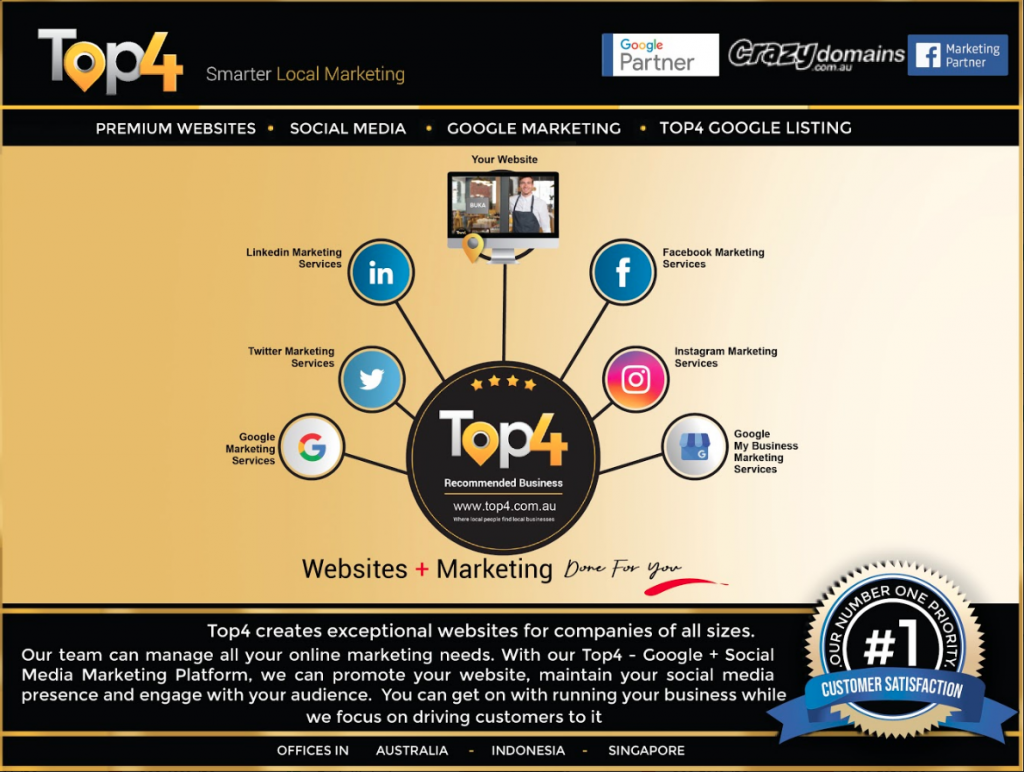We analyzed 5 million Google search results to better understand organic click through rate.
First, we analyzed CTR data across 874,929 pages and 5,079,491 search queries.
Then, we looked at how factors like title tag length, sentiment and meta descriptions affect organic CTR.
Thanks to data provided from ClickFlow, we were able to get CTR data from several different Google Search Console accounts.
So without further ado, let’s see the results.
Here is a Summary of Our Key Findings:
1. The #1 result in Google’s organic search results has an average CTR of 31.7%.
2. The #1 organic result is 10x more likely to receive a click compared to a page in #10 spot.
3. Organic CTR for positions 7-10 is virtually the same. Therefore moving up a few spots on the bottom of the first page may not result in more organic traffic.
4. On average, moving up 1 spot in the search results will increase CTR by 30.8%. However, this depends on where you’re moving from and to. Moving from position #3 to position #2 will usually result in a significant CTR boost. However, moving from #10 #9 doesn’t make a statistically significant difference.
5. Title tags that contain a question have a 14.1% higher CTR vs. pages that don’t have a question in their title.
6. Title tags between 15 to 40 characters have the highest CTR. According to our data, pages with a title tag length between 15 and 40 characters have an 8.6% higher CTR compared to those that are outside of that range.
7. URLs that contain a keyword have a 45% higher click through rate compared to URLs that don’t contain a keyword.
8. Adding “Power Words” to your title tag may decrease your CTR. We found that titles with Power Words had a 13.9% lower CTR compared to titles that didn’t contain Power Words.
9. Emotional titles may improve your CTR. We found that titles with positive or negative sentiment improved CTR by approximately 7%.
10. Writing meta descriptions for your pages may result in a higher CTR. Pages with a meta description get 5.8% more clicks than those without a description.
I have detailed data and information of our analysis below.
The #1 Result In Google Gets 31.7% of All Clicks
The initial goal of our study was to establish CTR benchmarks.
Using our full data set of ~5 million results, we found that the #1 result has the highest CTR (by far).
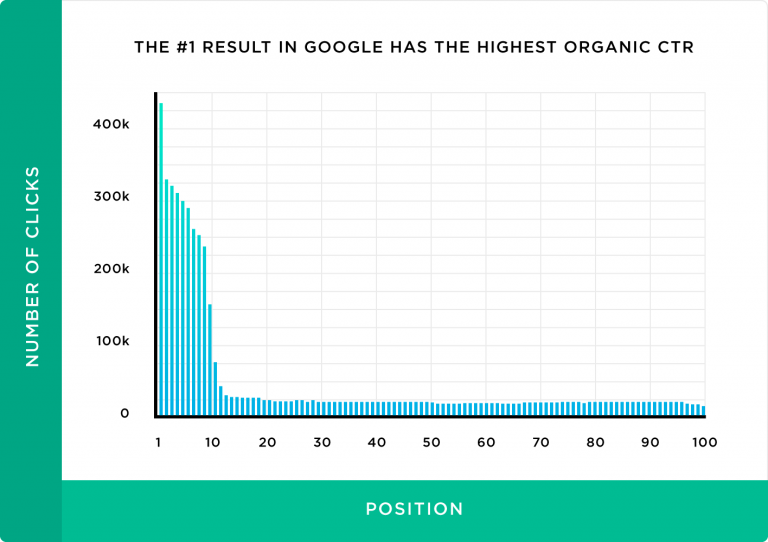
We also saw a sharp CTR dropoff starting on the 2nd page of the results.
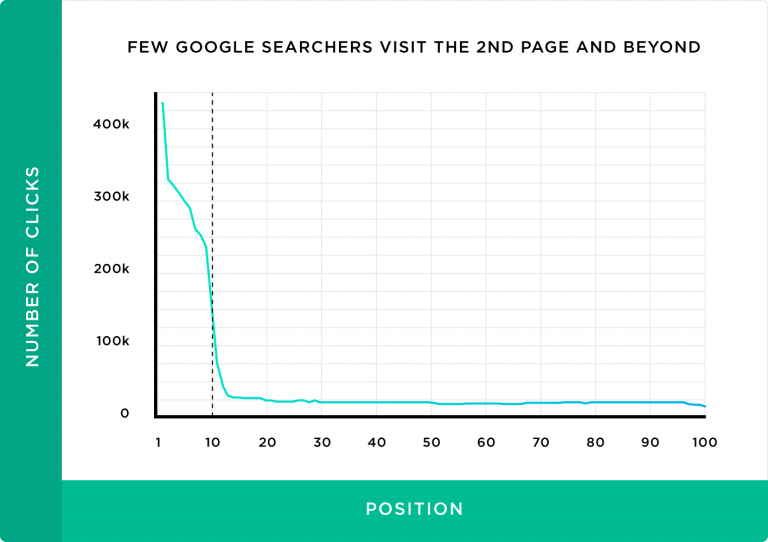
In fact, only 0.78% of Google searchers clicked on something from the second page.
This CTR trend is consistent with other CTR industry studies, like this one from Advanced Web Ranking.
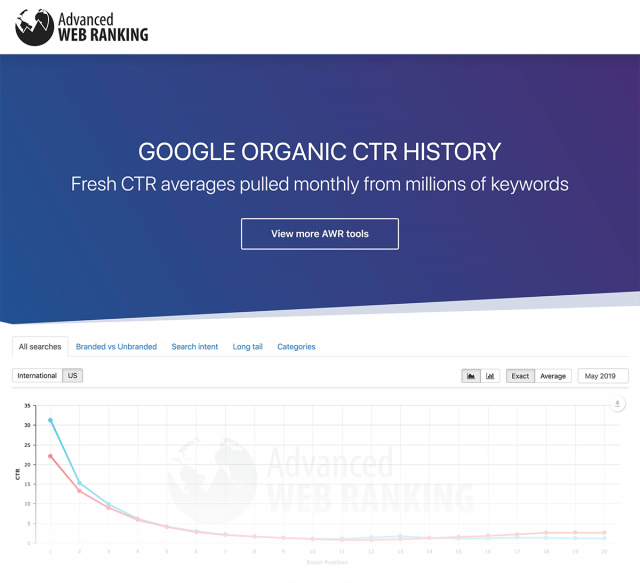
Because CTR starting on the 2nd page is extremely low, we wanted to zero-in on the first page results. So we re-ran this analysis with data that excluded results from page 2 and beyond. We also eliminated queries that may skew the results with an abnormally high CTR (for example, branded queries).
And after we analyzed only the first page results with this data subset, we found that the #1 result in Google has a CTR of 31.7%.
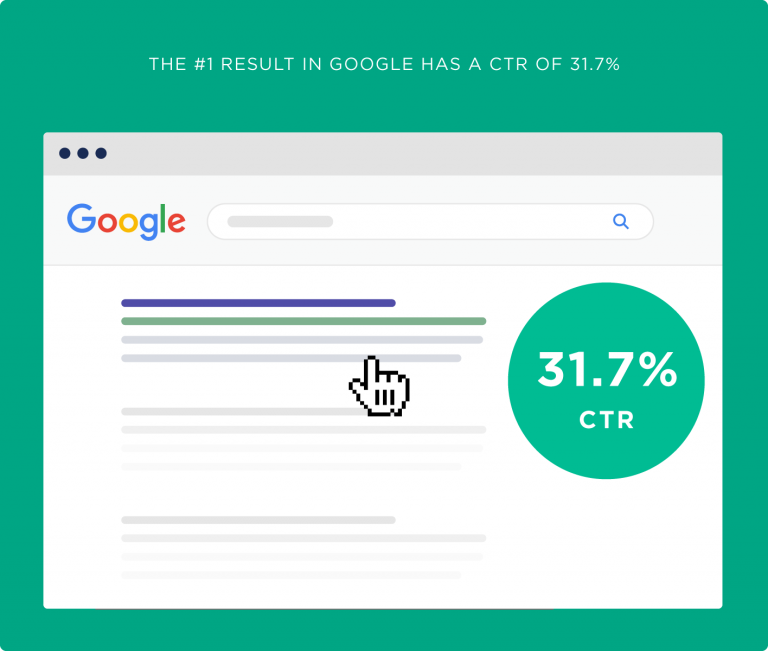
Here is the full CTR breakdown for Google’s first page organic results:
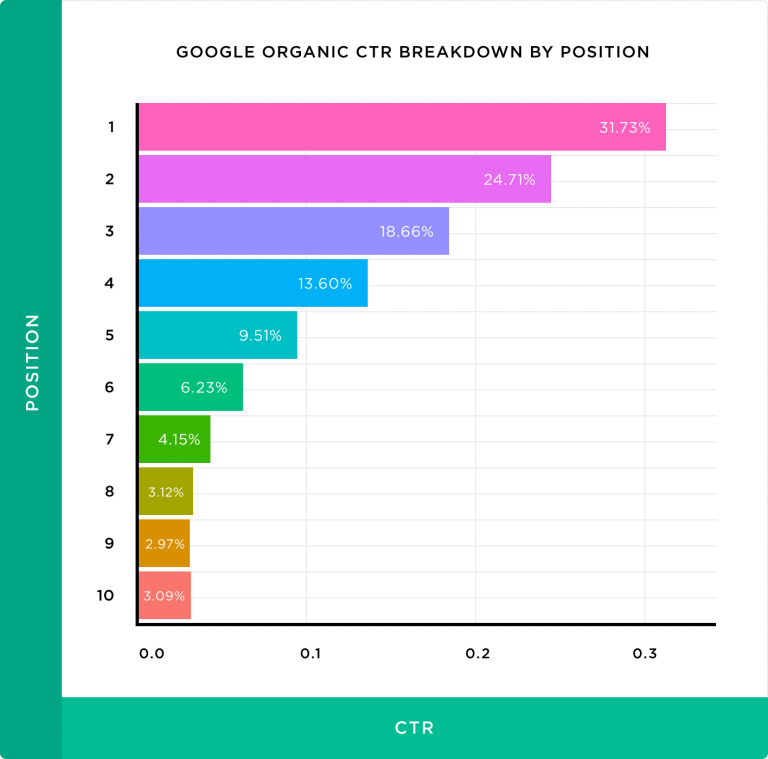
As you can see, the #1 result in Google has a 10x higher CTR compared to the #10 result.
For anyone that’s worked in the SEO field for any length of time, this finding shouldn’t come as a surprise. It’s well known that ranking #1 is significantly more valuable than any other position.
That’s because, according to a recent Moz survey, many Google users instinctively click on the first result in Google. This likely explains why the #2 result, which is just a few mere pixels below the #1 spot, has such a large CTR dropoff.
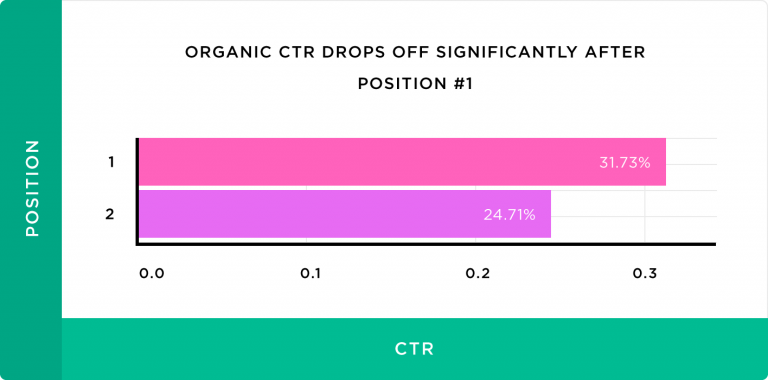
Key Takeaway: The #1 result in Google gets 31.7% of all clicks.
Organic CTR Spikes At Position #5… And Again At Position #3
As I outlined, the #1 result in Google has (by far) the highest CTR.
However, there are still clicks to be had outside of the top position.
Specifically, while CTR is relatively flat between positions #6-#10, there’s a significant CTR spike starting with position #5.
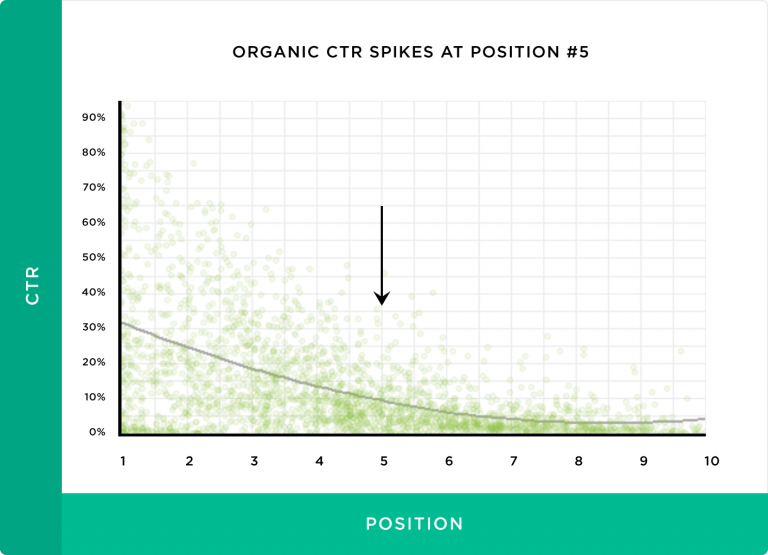
This suggests two things:
- Most users don’t scroll past the 5th result.
- Moving up from position #6 to #5 may result in a significant CTR boost.
We see another sharp CTR increase starting with position #3.
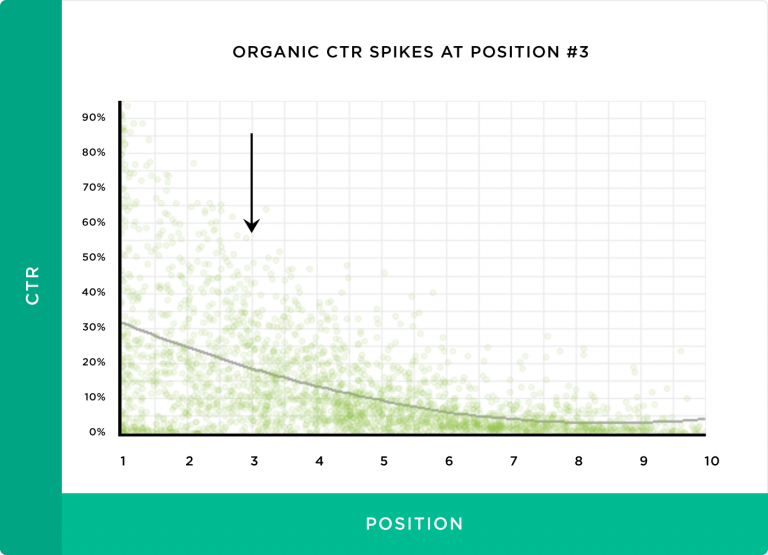
This may be due to the fact that, for results without ads or SERP features, the #3 result often appears above the fold.
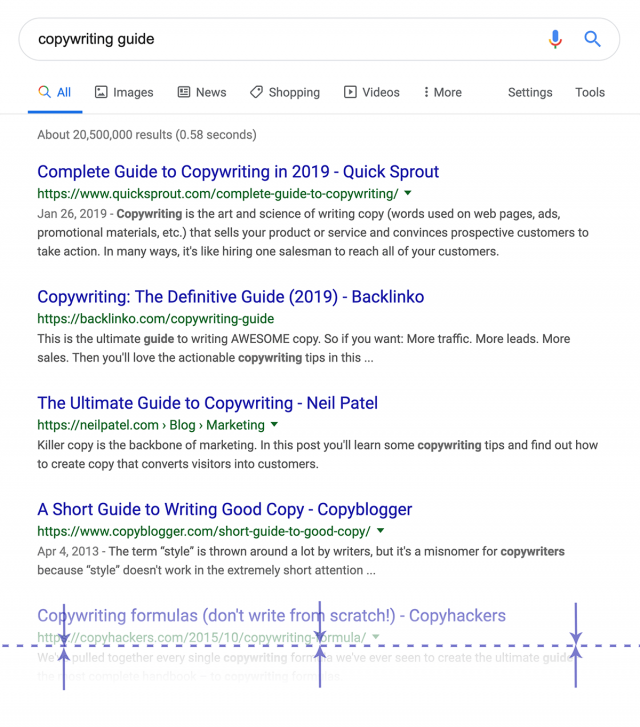
In fact, we found that the top 3 Google search results get 75.1% of all clicks.
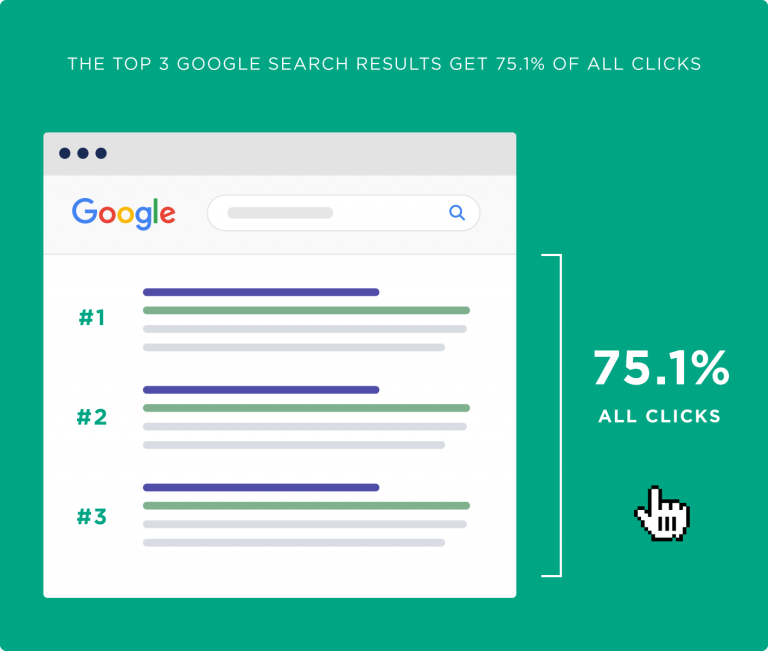
Key Takeaway: Our data suggests that “ranking on the first page” may not be a worthy SEO goal. Instead, it’s all about ranking in the top spot (or at least in the top 3). The top 3 organic results get 75% of the clicks.
Moving Up One Position Increases CTR By 30.8%
We discovered, all things being equal, moving up a single position in Google increases relative CTR by 30.8%.
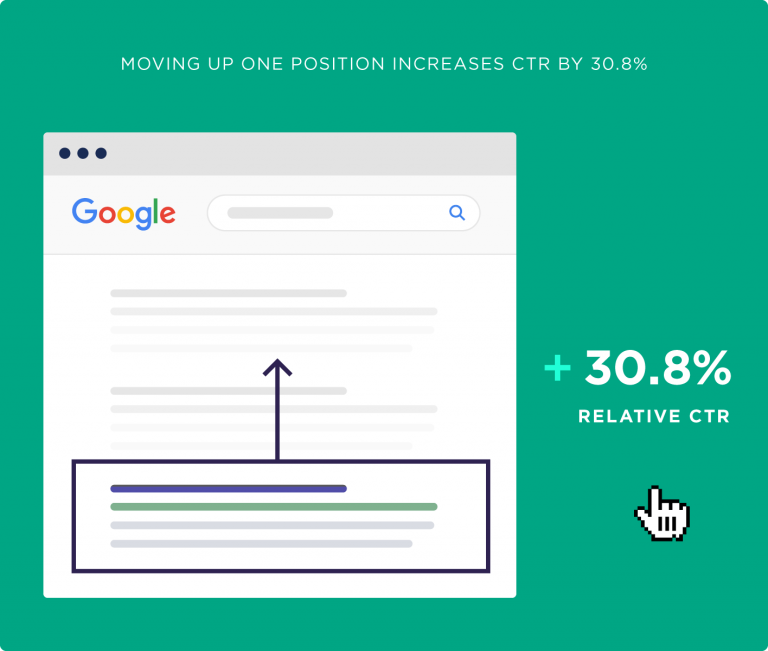
However, this CTR boost isn’t evenly distributed. Not even close.
The CTR impact of moving up in the SERPs varied widely depending on position.
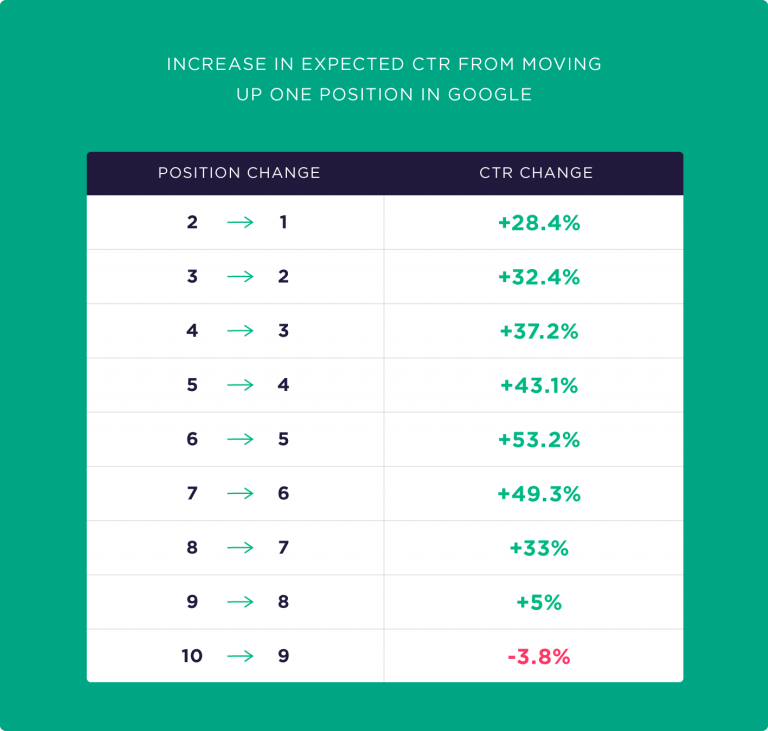
For example, moving from position #9 to #8 will result in 5% more clicks. Not a huge difference.
However, moving up from #6 to the #5 spot will result in 53.2% more clicks.
Key Takeaway: Moving up one position in Google will increase your relative CTR by an average of 30.8%. However, this increase varies greatly depending on position. We found that the greatest CTR increase came from moving from #6 to #5, which resulted in a relative CTR boost of 53.2%.
Most Websites Get 8.1 Clicks Per Query
We also looked at, for all the queries reported in the Google Search Console, how many resulted in clicks.
First, we discovered that most of the queries that a site ranks for in Google get very few impressions.
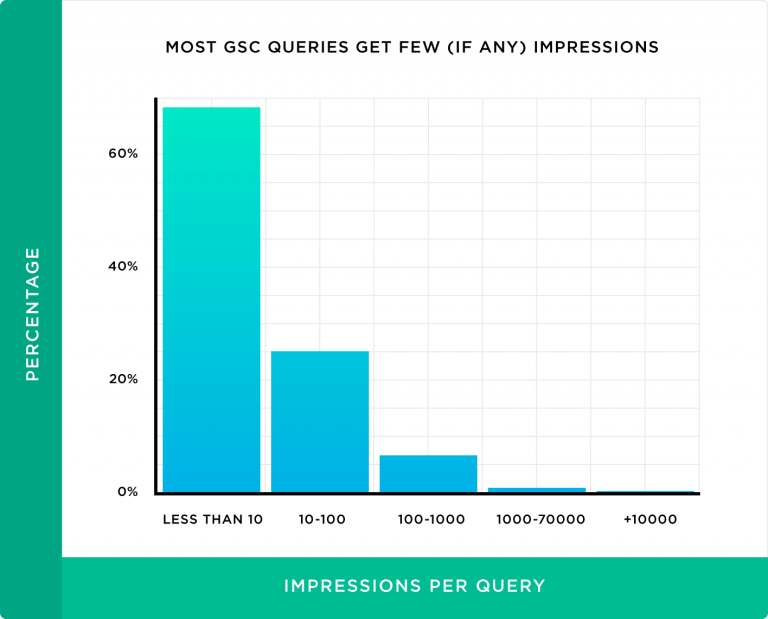
This suggests that most of the keywords that a site ranks for are long tails with low search volume. Or that the site isn’t ranking highly for these terms. Or both.
And likely due to a low number of impressions, most queries result in a small number of clicks (8.1 per query).
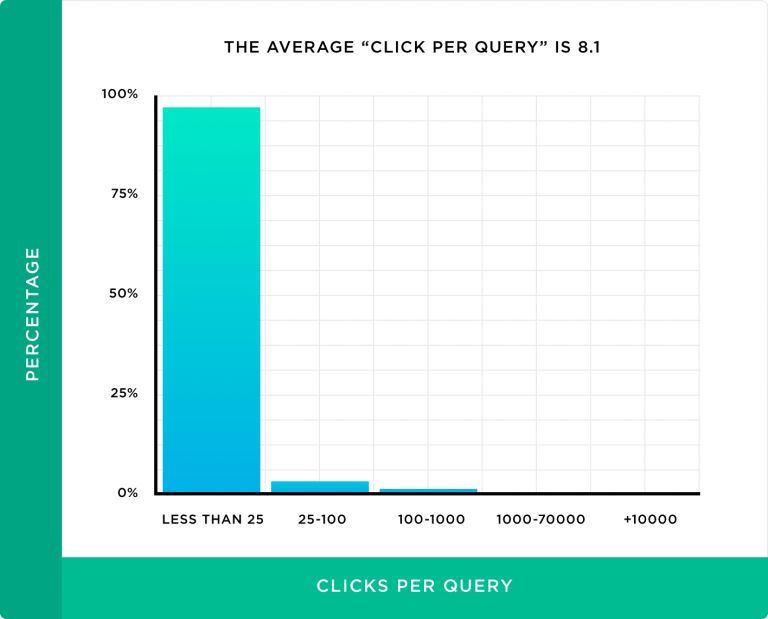
Key Takeaway: “Ranking for X keywords” may not be a valuable SEO metric. That’s because most pages rank for keywords with little search volume. Instead, most impressions and clicks tend to come from a relatively small number of queries.
Question Titles Have an Above-Average CTR
We compared the average organic CTR between titles that contained and didn’t contain a question.
(We defined a question as a title that used the terms “How, Why, What, Who” or a title with a question mark).
We found that titles with questions had a 14.1% higher click through rate compared to titles without a question.
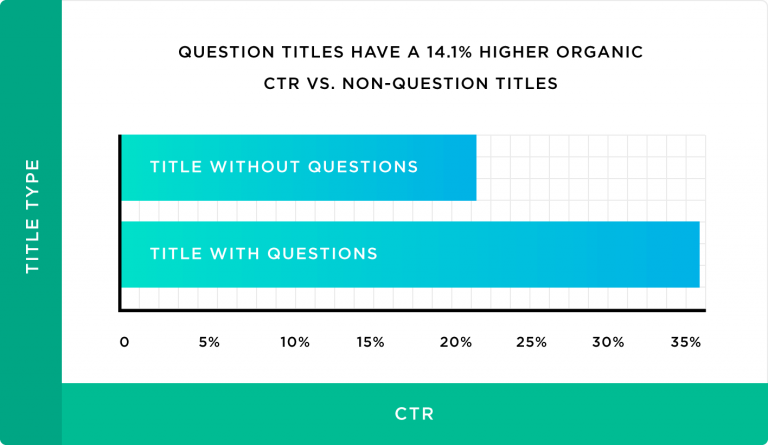
Here’s the full CTR breakdown across the top 10 results.
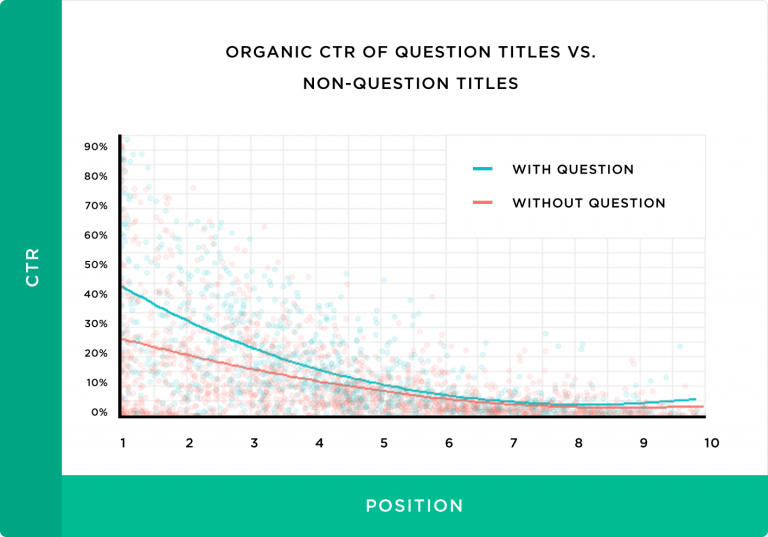
This finding is consistent with headline CTR studies, like this one published in the journal Social Influence.
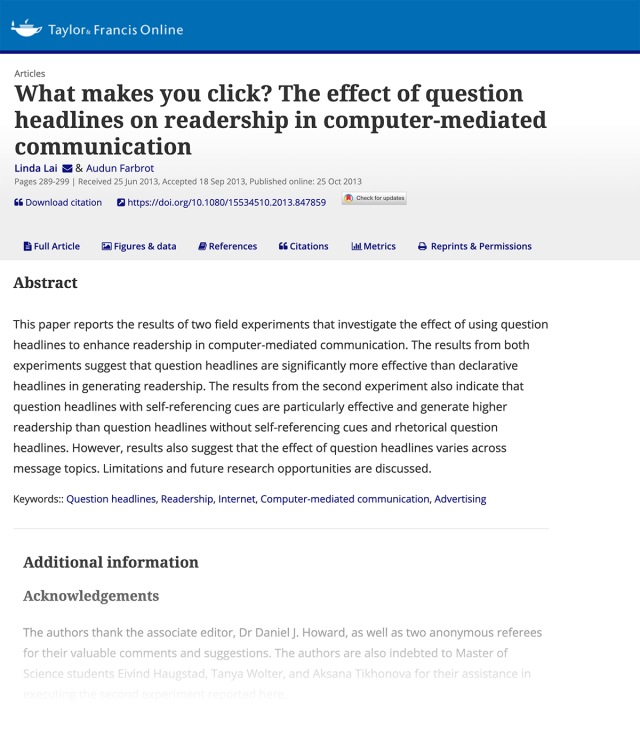
Questions may improve CTR because, when someone is searching for something in Google, they’re essentially looking for an answer to a question.
(They are called “queries” after all).
And using a question title may confirm to the reader that your result contains the answer to their exact question.
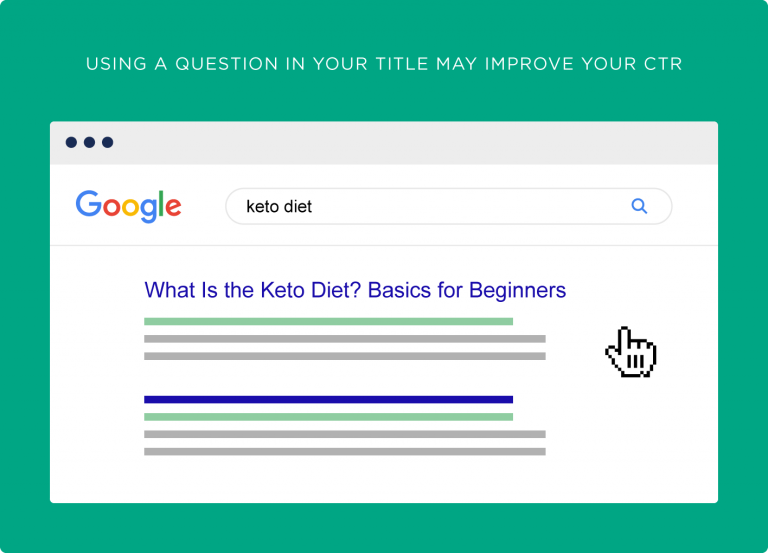
For example, I used a question title on this page optimized around the term “nofollow link”.
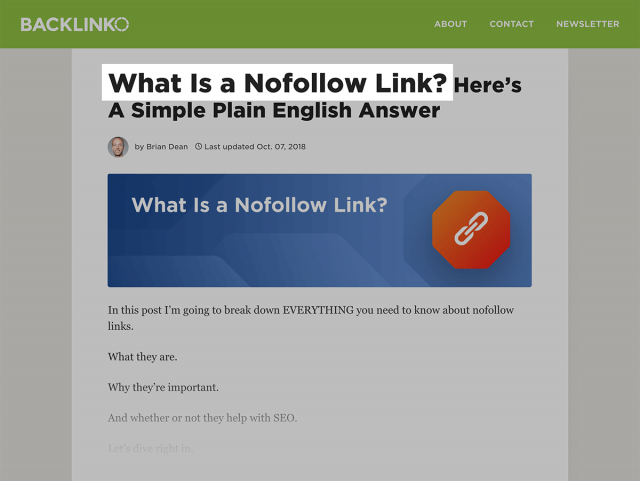
According to my GSC data, that page has a CTR of 29.2%.
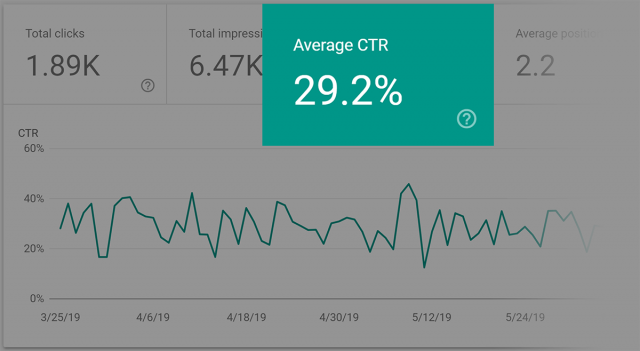
Most people searching for a broad term like “nofollow link” want to know what a nofollow link actually is. And my question title shows that my result will give the searcher the answer they’re looking for.
Key Takeaway: Question-based title tags have a 14.1% higher CTR compared to non-question titles.
Title Tags Between 15 to 40 Characters Have The Best CTR
What’s the ideal title tag length? Should you keep your titles short and sweet? Or use long titles that contain lots of info about your content?
According to our data, you want to aim somewhere in the middle.
Specifically, we found that titles between 15 to 40 characters have the highest organic CTR.
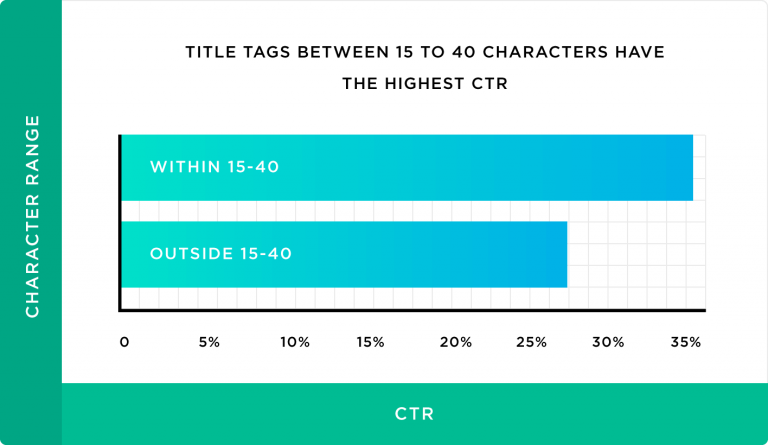
While there may be an SEO benefit of long title tags (longer titles=more keywords), this may be partially offset by a lower organic CTR.
In fact, Etsy tested numerous title tag variations as part of a large-scale SEO experiment. And they discovered that “It appeared in our results that shorter title tags performed better than longer ones.”
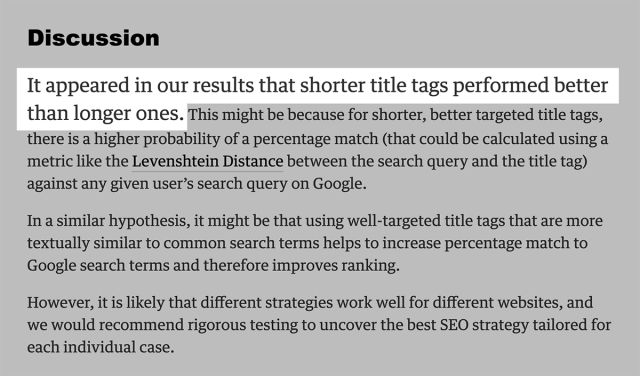
The author of that post hypothesized that shorter titles may perform better in Google due to query matching. However, according to our analysis, CTR may also play a role in why short and medium titles work best.
Key Takeaway: Title tags between 15 and 40 characters have the best organic CTR. Titles inside of this range have an 8.6% better average click-through-rate compared to those that fall outside of this range.
Keyword-Rich URLs Are Correlated With a Significantly Higher CTR
We wanted to see if keyword-rich URLs positively impacted CTR.
For example, take someone searching for “weekend trips”. Would a URL like travel.com/weekend-trips have a higher CTR than travel.com/travel-page?
To accomplish this analysis, we looked at each of the search queries, compared them with the URLs, and provided a similarity index that ranged from 0% to 100%.
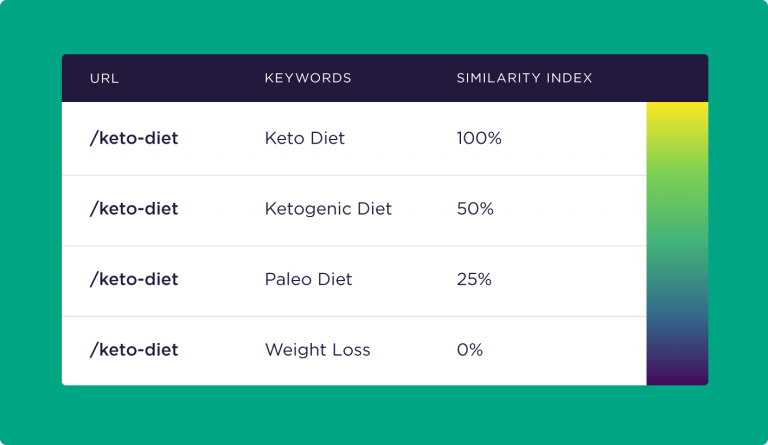
A value of 0% means that the two words are not similar at all, while a value of 100% means a perfect match. We ignored all punctuation marks and symbols. We also treated certain words as the same (book vs books, cake vs cakes, etc.).
Indeed, we found a strong correlation between keyword-rich URLs and organic CTR (p-value = 0.01)
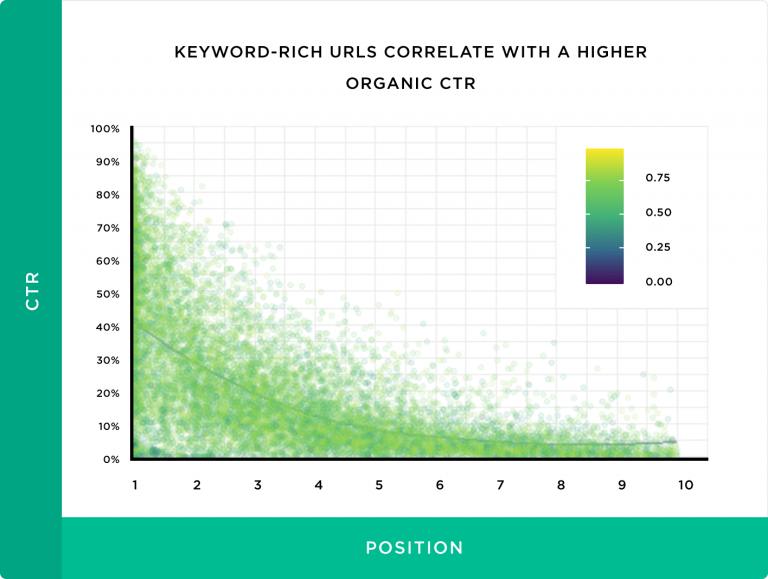
Although having a perfect query-keyword match resulted in the highest CTR, our data shows that a URL that partially matches a query can also result in a significant CTR boost.
Google’s Search Engine Optimization guide reminds webmasters that your page’s URL shows up in the SERPs. And they recommend that you use “URLs with words that are relevant to your site’s content…”.
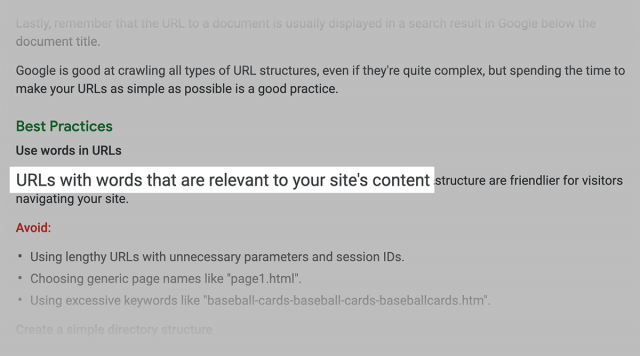
And a 2012 paper published by Microsoft found that “trusted domains” had a higher CTR in search engines compared to domains that people weren’t familiar with.
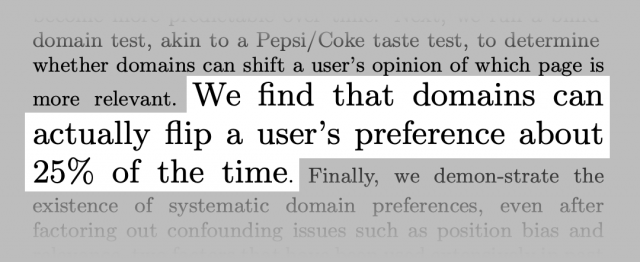
The theory behind this is that search engine users use a page’s URL to figure out the best match for their query.
Key Takeaway: We found a 45% increase in CTR for pages with a perfect query match (the entire search query is in the URL) vs. a non-match (no search query term matches the URL).
“Power Words” May Negatively Impact Click Through Rate
“Power Words” are specific words and phrases designed to help your headlines stand out, and in theory, get more clicks.
For example, Power Words and terms like:
- Secret
- Powerful
- Ultimate
- Perfect
- Best
- Insane
- Amazing
Our data found that Power Words actually decreased CTR by 13.9%.
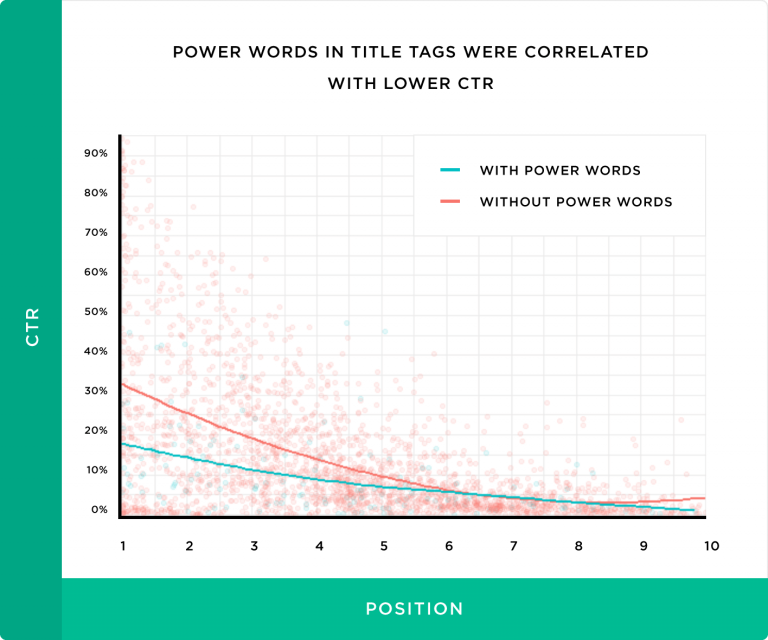
My theory on this is that, while Power Words are great for grabbing attention on noisy platforms (like Facebook), they may look like clickbait in Google’s search results.
For example, look at the top 3 results for the keyword “how to write headlines”.
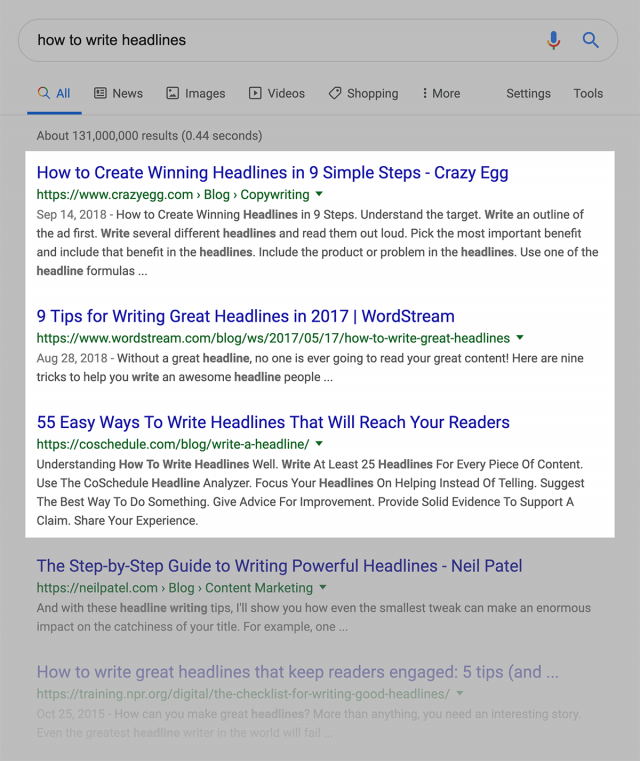
For a keyword like this you’d expect over-the-top titles like “How to Write Insanely Amazing Headlines”.
However, the top 3 results all use title tags that are pretty subdued.
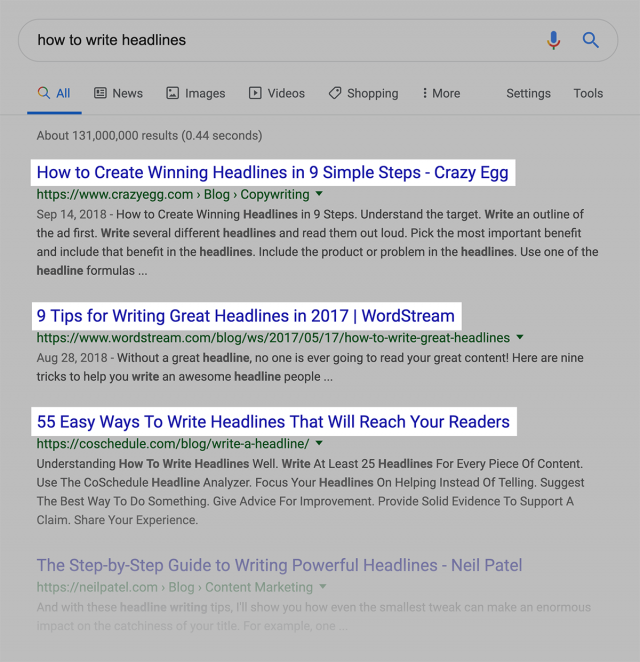
Key Takeaway: While Power Words may work on social media, they can hurt your organic click through rate. In fact, titles with Power Words have a 13.9% worse CTR compared to titles without any Power Words.
Emotional Titles Can Increase Organic Click Through Rate
Our data suggests that emotional titles (titles with a positive or negative sentiment) have a higher CTR compared to emotionally-neutral titles.
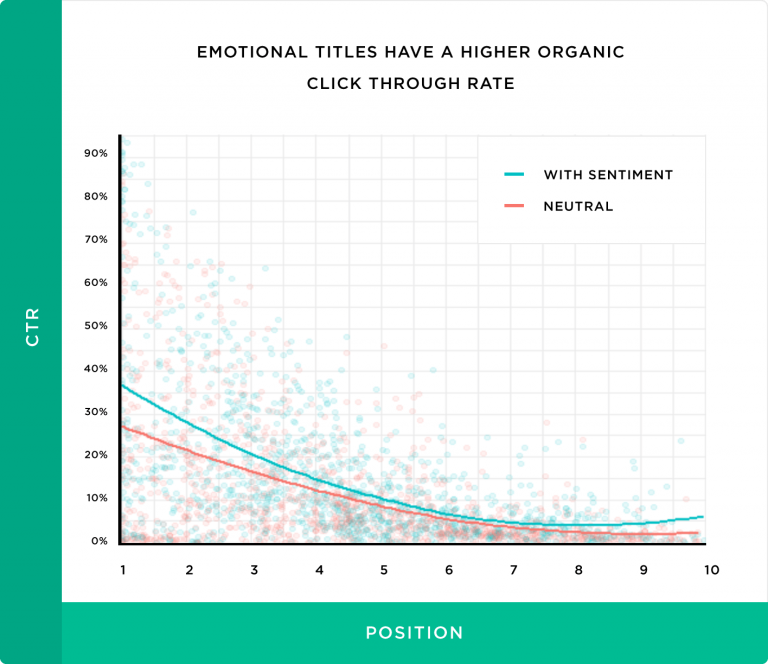
Specifically, we found that emotional titles have a 7.3% higher absolute CTR compared to non-emotional titles.
We also discovered that negative and positive titles tend to work equally well. Controlling for other variables (like ranking position), titles with a positive sentiment have a 7.4% higher CTR, while titles with a negative sentiment have a 7.2% higher CTR.
For this analysis we analyzed each word in the title for “text polarity”. And each title was assigned a sentiment score based on the title’s estimated negative or positive sentiment.
For example, a title like this was considered neutral.
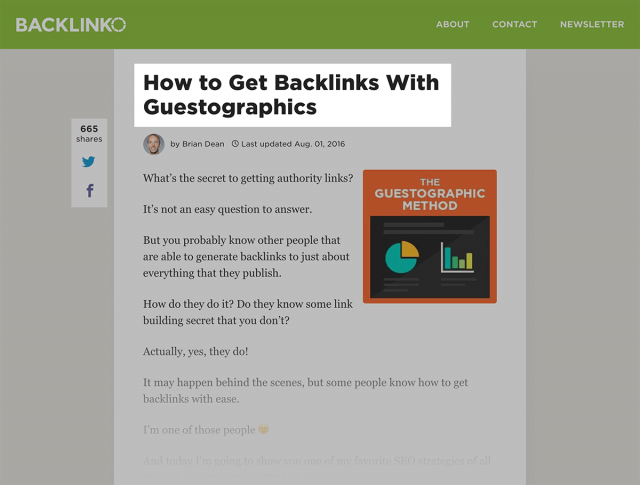
And this title was scored as having a positive sentiment.
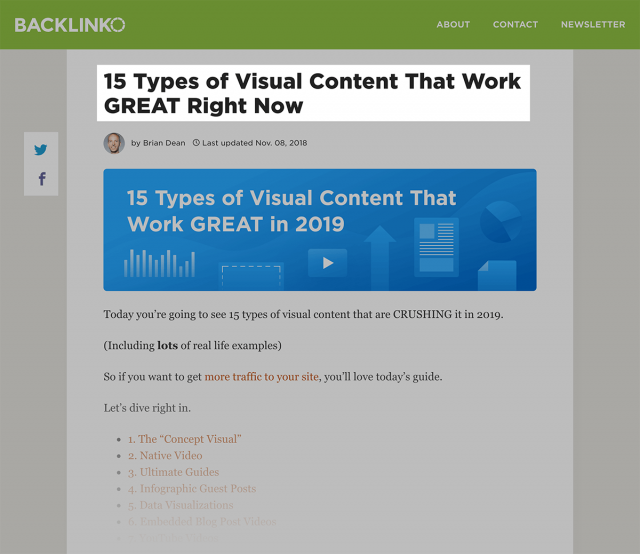
Several industry studies, including this one from BuzzSumo, have found a correlation between emotional headlines and engagement.
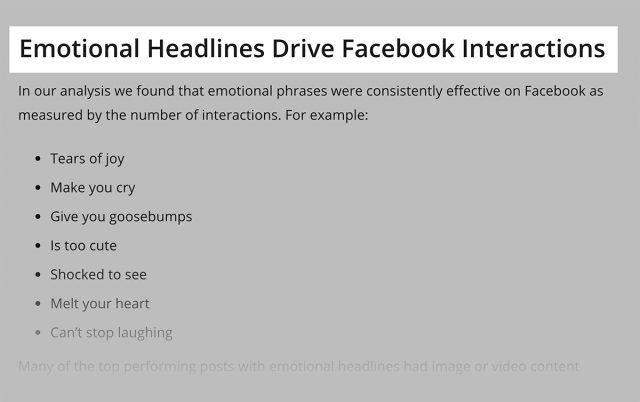
However, I wasn’t able to find any industry study that specifically looked at the relationship between emotional title tags and Google organic CTR.
And at least according to our data, emotional titles can result in a higher click through rate in the organic results.
What’s interesting is that, while we found that Power Words hurt CTR, emotional titles help CTR.
This may be due to the fact that sentiment is a more nuanced metric than the presence or absence of a single Power Word. In other words, it’s possible to write an emotionally-charged title without using a Power Word. And titles that deftly push emotional buttons without looking like clickbait can stand out and get more clicks in the SERPs.
Key Takeaway: Titles with negative or positive sentiment have a higher organic click through rate vs. neutral titles.
Pages With a Meta Description Have a Higher Average CTR vs. Pages Without a Description
Even though descriptions don’t directly impact SEO, Google still recommends writing a unique meta description for every page on your site.
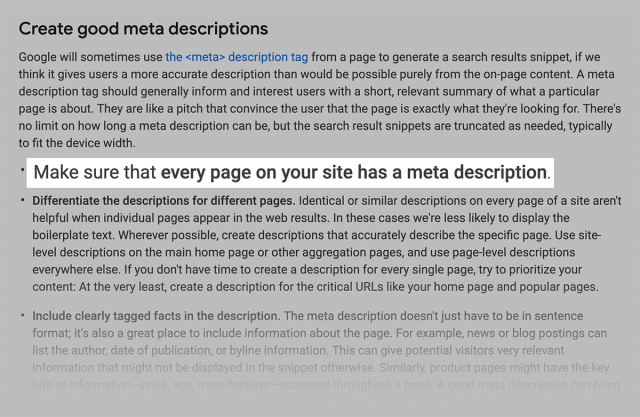
In fact, they even suggest that well-written descriptions can improve the number of clicks you get from Google search.

Which is why we decided to compare organic CTR between pages with and without a meta description. We found that pages with meta descriptions had a 5.8% better CTR compared to pages without a description.
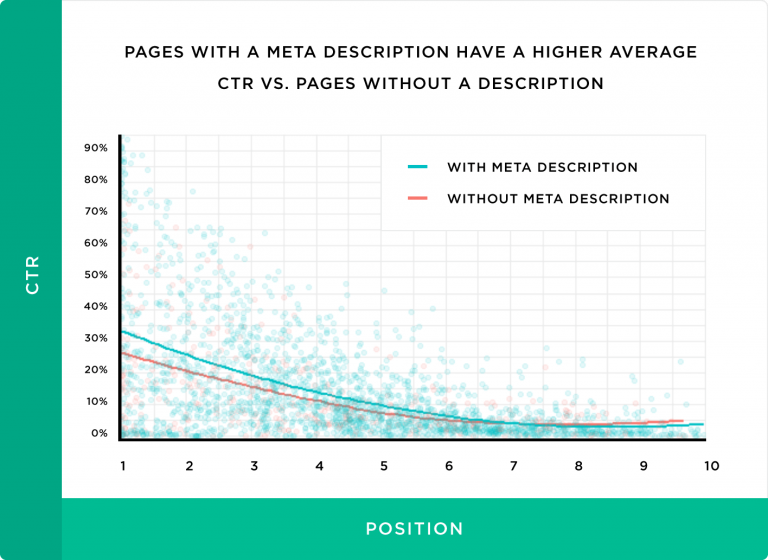
This finding shouldn’t surprise anyone with experience in SEO. Even though Google doesn’t always use the meta descriptions you write for them, your meta description can appear fairly often in the SERPs.
Without a meta description to fall back on, Google has to pull snippets from your page to fill in that space in your snippet.
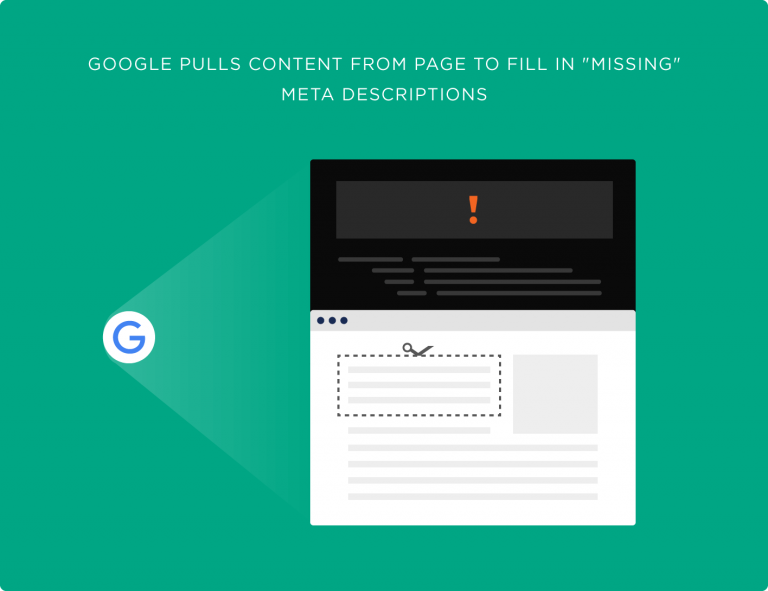
And the text that Google pulls from your page is almost always going to be less enticing than a well-written description.
Key Takeaway: Writing unique meta descriptions for each page can increase your site’s organic CTR. We found that pages with a meta description had a 5.8% higher CTR compared to pages without a description.
Looking to build customer loyalty through social media? Don’t forget to add your business to Top4.com.au
List your business, create your own digital store to sell goods and services, and share posts on social media. Promote your business on Google instantly! Should you need help with local digital marketing then view our new Google Marketing Platform and services Top4 Marketing
Get Found On Google Promote Your Website, Reach local customers today!
Our Digital Marketing Agency Services Across All Industries Include Search Engine Optimisation (SEO), Google Marketing, Website Design, Corporate Web Development, and local location-based marketing using our own Google Marketing Platform!
Engage A Social Media Agency For Only 1/3 The Cost Of Employing A Social Media Manager…LET’S TALK!
Source: backlinko

